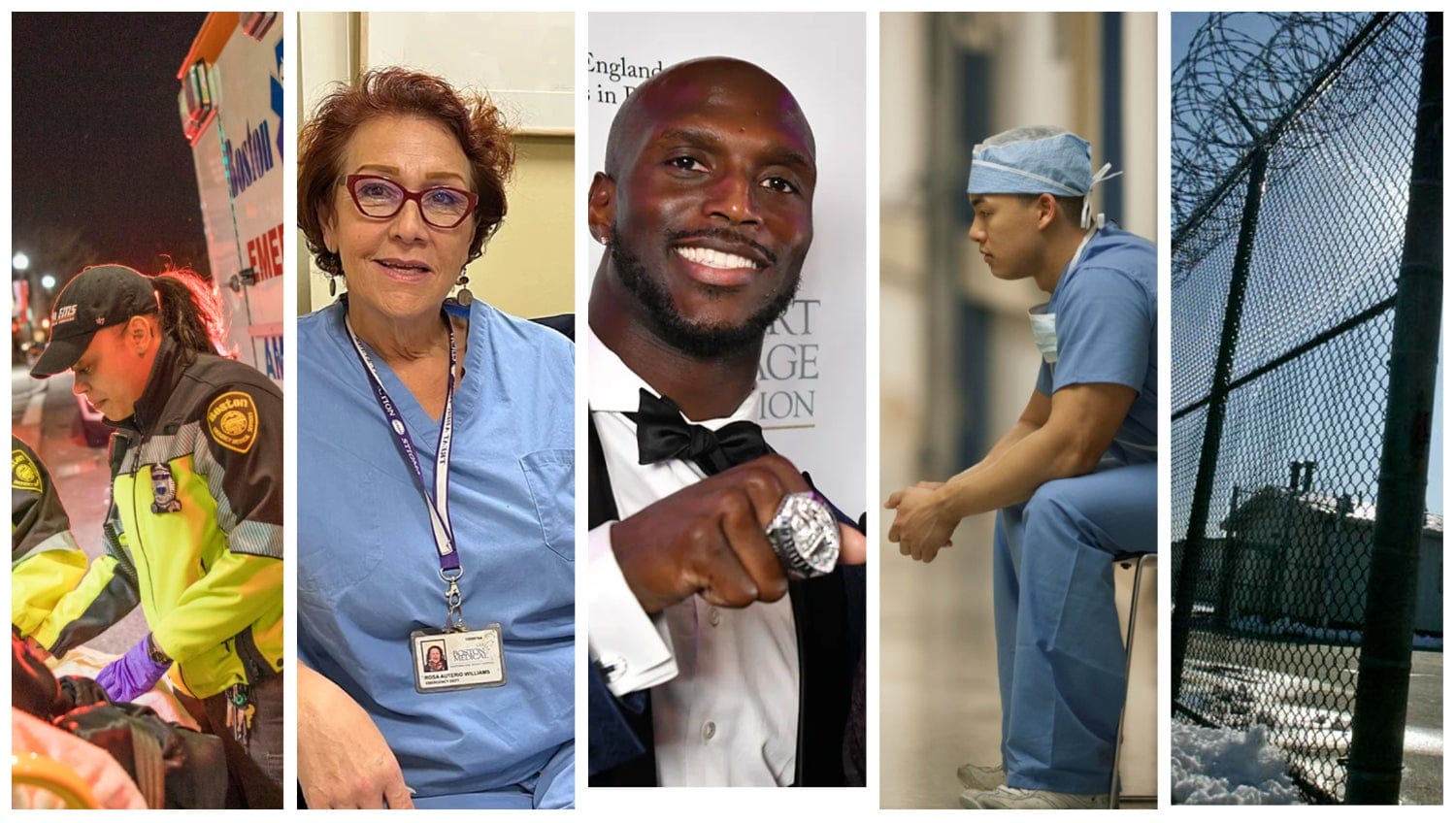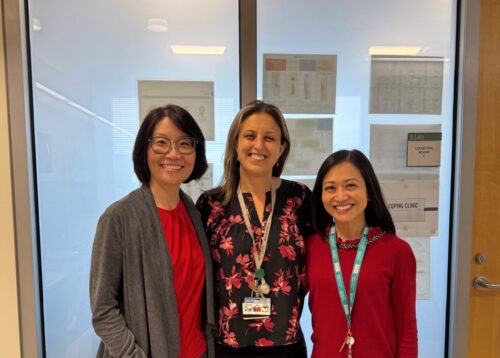When Medicine Gets Personal: 5 Narratives That Moved Us This Year
December 22, 2022

MediaNews Group/Boston Herald, Getty Images; Boston Medical Center; Paul Horwitz of Atlantic Photo Service, Inc; Getty Images (2)
This year’s community stories touched on the overdose crisis, sickle cell disease, and the mental health toll of the COVID-19 pandemic.
As 2022 comes to a close, we looked back at the personal stories we shared this year. These narratives portray the experiences of those in our BMC community who have made it their work to raise awareness and create change for the future. By sharing their stories, they may help guide others to navigate their own medical needs and deal with high-risk circumstances.
1. Addiction counselor Rosa Auterio-Williams shares her personal story of her life mission to assist others in SUD recovery
A licensed alcohol and drug counselor at Boston Medical Center opens up about her own experiences in recovery from opioid addiction and how it helps her walk alongside others on a similar path. Auterio-Williams writes about how she has been in sustained recovery for 23 years, and her life experiences in with addiction are crucial to her being able to see the humanity in every single person who similarly lives with substance use disorder. For her, working in recovery isn’t just a job; it’s a life mission.

Rosa Auterio-Williams, CADC, LADC, Boston Medical Center
“For nearly 20 years, I was living in the throes of an opioid addiction on the streets of New York City. Somewhere along the line, someone saw in me what I couldn’t. When I finally went into long-term treatment at Project Return in the Bronx — unfortunately no longer in operation — my counselor, a woman named Alvera, told me, ‘You are a human being who is loved, and until you learn to love yourself, I will love you.’ She and many others built me up to a place where I felt confident enough to go on and maintain my sobriety at whatever length I had to.
I’ve never forgotten her, and I try to be an Alvera to the people who come to see me.”
2. Devin and Jason McCourty fight for a sickle cell disease cure in honor of their Aunt Winnie
The McCourty twins are famous for what they’ve done and continue to do on the football field, including with the hometown New England Patriots, but their legacy will include much more than sports. In honor of their Aunt Winnie, who died due to complications with sickle cell disease — a disease that overwhelmingly affects people of African descent — they have dedicated themselves to finding a cure through advocacy work.

Jason McCourty, NFL player and Boston Medical Center hospital board member
“My aunt was such a fighter. Throughout her life, she was able to work, travel, and see the world. Before she passed, she was on oxygen 24/7. She had lost eyesight in both of her eyes. She had hip surgery. She would get a common cold and be hospitalized for two weeks. And then she’d get leg sores from being bedridden for so long…
As tough as it was for her, just her faith and her fight throughout her journey was definitely inspiration for Devin and me. Not only to do the work in sickle cell, but just continue to live our lives and not take things for granted and be grateful.”
3. Psychologist Shamaila Khan opens up about the trauma of the COVID-19 pandemic for healthcare workers
At this point, it’s safe to say that the COVID-19 pandemic has had an effect on everyone’s mental health, but especially for healthcare workers, who have been on the frontlines since the very beginning of the pandemic. Khan writes about the importance of finding kinship at work and how leaning on your colleagues can help heal psychological wounds born from trauma. She speaks of her own “buddy” from the early days of COVID and how their check-ins provided a much-needed respite during those challenging first few months.

Shamaila Khan, PhD, clinical psychologist, Boston Medical Center
“What ended up working really well for our staff at Boston Medical Center was the buddy system. The buddy system is a model adopted from the military field: “the battle buddy system.” We aimed to get workers in the crisis settings to have a daily buddy (a peer/co-worker) with whom they could check in with throughout or at the end of the day to share, if desired, their experience in the high-stress work environment. Rev. Jennie Gould, PhD, BCC, director of Clinical Pastoral Education, was often my buddy, and having her there to talk about the kinds of traumatic and challenging encounters we each had was relieving. It tackled the sense of loneliness and disconnect that we can feel being alone with traumatic encounters and created a human connection with someone who is experiencing the crisis in the same setting.
Overall, it allowed frontline workers to lean on each other while they sift through the emotionally and mentally taxing realities of crisis intervention work.”
4. Recovery coach Tyshaun Perryman tells his father’s story of involuntary addiction treatment in prison
In December of 2021, Tyshaun Perryman, CARC, recovery coach with BMC’s Project CHORUS and a member of Massachusetts Organization for Addiction and Recovery services, testified to the state legislature against involuntary commitment to a prison to access substance use disorder treatment. He knows the experience all too well. He filed a petition to commit his father when he felt he had no other options and didn’t know what else to do. And he shared this deeply personal story in his fight against putting others in the situation to make the same decision.

Tyshaun Perryman, CARC, Boston Medical Center
“My experience with Section 35 is deeply personal. I had to petition for a Section 35 commitment for my own father after his issues with mental health and substance use grew out of control. As a family, we faced the stigma of sending their loved one into captivity against their will, a stigma faced by others in the African American community who want to get help for their family.
Filing that petition for my father was the hardest thing I have ever done in my life. In the courtroom, I remember looking at him as he experienced shame, bewilderment, and nothingness at the same time, knowing involuntary commitment to prison was not the answer. He was supposed to be there for treatment, but instead, my father, a 65-year-old Army veteran, lived in a cell under the supervision of prison guards. He even had to spend a large piece of his Social Security check to make expensive phone calls. He was not treated like a patient. He was treated like he was guilty of a crime. Being treated that way did not help him. He relapsed in two days.”
5. First responder Stephen Murray gets real about the stigma of addiction as a paramedic and overdose survivor
First responders are a critical part of the healthcare system’s collective response to the overdose crisis and , as Murray writes, the way they care for patients experiencing an overdose can have a huge impact on the continuity of care for that patient. He describes working as a paramedic with other first responders who did not always respond with compassion for those experiencing an overdose. As a person who survived an overdose, Murray knew how being greeted with warmth and compassion made a huge difference in the care experience, and he shares his personal story as a way to allow others to see how a little compassion can go a long way for patients recovering from an overdose.

Stephen Murray, MPH, NRP, overdose researcher, Boston Medical Center
“Emergency medical services (EMS) is interesting because you have one foot in the public safety (fire & police) realm, and the other foot in the healthcare system. Not only do we as emergency medical technicians (EMTs) bring people to the emergency department, but we transfer people off admission floors, we take people to dialysis, we’re in skilled-nursing facilities, in patients’ homes — we’re everywhere. We have a bird’s eye view, and through that I saw the little ways we made life harder or easier for the people we encountered.”







